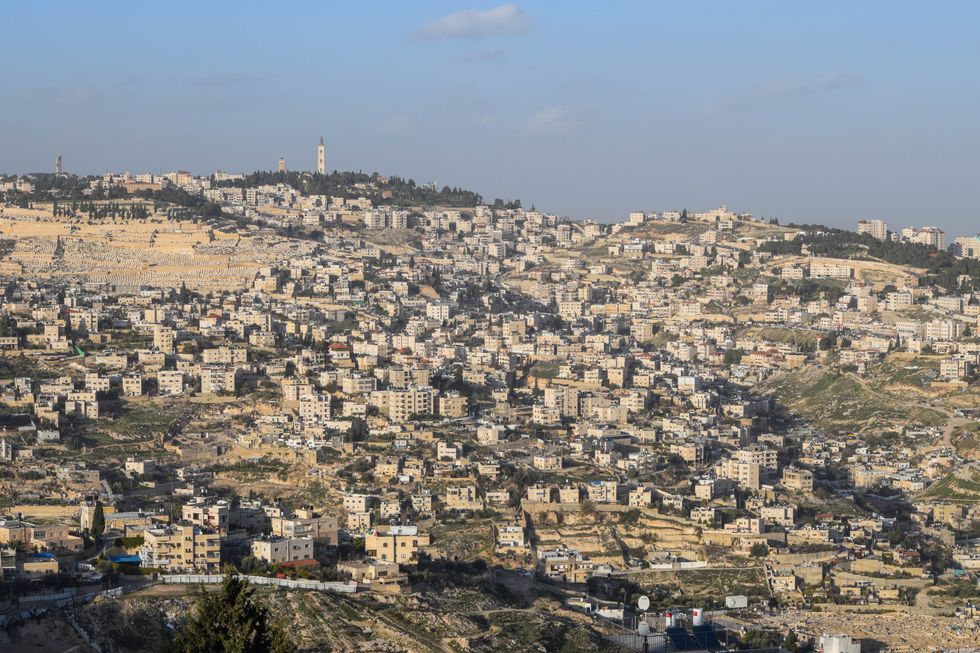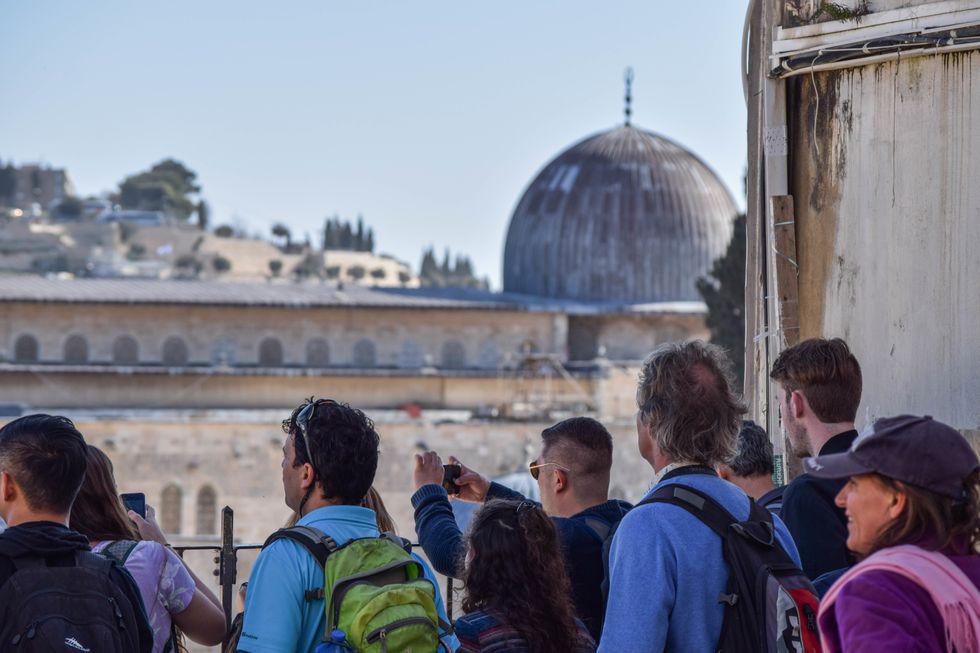Alright, we have embarked on this adventure. We have landed in Tel Aviv at Ben-Gurion Airport, named after David Ben Gurion, the man regarded as the "founder of Israel" (he was also the first Prime Minister of Israel).
Right off the bat, we are reminded that we will see and hear things on this trip that 100% conflict with each other. We will hear things that may not be historically or archaeologically accurate at all. We will hear one person say one thing as his or her truth, and the next speaker say the exact opposite. This does not mean that one truth is any less true than another truth.
Everyone has their own truth that is absolutely true--to themselves. It is not our place to say that one truth is more or less true; rather, we are quite lucky to be in a position where so many people are willing to share their truths with us.
Our guide, Roni, is Jewish but married to a German Catholic woman. Our first bus driver, Hakkeim, is Arab-Israeli. Our second bus driver, Naseem, is from the Druze village, though I don't know if he is secular or religious. Our bodyguard, Na'ama, is in the Israeli Defense Forces (the Israel national army). Our leader from the Berkeley campus, Rabbi Adam, is very observant of his faith but more tolerant of other religions and beliefs than most people I've met.
Our group consists of people who are atheist, agnostic, spiritual, Christian, Catholic, Jewish, conservative, liberal, Libertarian, gay, straight, bi, queer, Asian, white, Indian, mixed, still confused and questioning--and everything in-between. It is one of the most diverse groups I have ever seen, even for Berkeley's campus. I can already tell that this is going to be an amazing group dynamic.
We are told to pay attention to the way each person uses language to convey a certain message. This will come into play with almost every word that is spoken.
We drive to Jerusalem upon landing in Tel Aviv. It's an extremely quick drive for cities that are on opposite sides of a country. This is a reminder of how physically small the area of land actually is. Israel and Palestine is the size of New Jersey, and it takes only about an hour for us to arrive at our hotel in Jerusalem.
My friend's mom told me before I left that the entire city of Jerusalem is built from the same type of stone: Jerusalem stone. It is beautiful. Regal. Shining. And all the buildings amaze me with their quiet majesty. We eat some sabich sandwiches (they have eggplant and egg and potato and other veggies) and settle in our rooms.
My roommate for our stay in this hotel is a Jewish girl named Elizabeth who has previously lived for a year in Israel. By the end of the trip, the few Jewish students in our group will have come to the conclusion that the Perspectives Trip has allowed them more introspection than any other trip to Israel has in the past. They've all been on Birthright and said that Perspectives is nothing like it; while Birthright is a celebration of their Jewishness, Perspectives gave them the chance to actually see, understand, and feel for all the other sides of this land's story.
For once, they went to Israel with non-Jewish people. They questioned their own previously held beliefs. They provided a perspective that I, as a non-Jewish student, would never have seen on my own.
That first night, a few friends from the group and I went to Ben Yehuda Street to explore the night markets. It was a hub of energy: people of all ages hopping around shops that were filled with eating, dancing, and laughing. I noticed that while most people spoke Hebrew, many also spoke Arabic and English; they were curious about where we were from but also extremely welcoming. I tried Rugelach, which is a buttery, chocolatey pastry resembling a mini croissant. SO yummy.
The next morning, we were met with Labneh (a sort of Middle Eastern/Greek yogurt thing?) and Za'atar (a Middle Eastern spice that is DELICIOUS) for breakfast--one of the best breakfasts I've ever tasted. We then, as the informal itinerary stated, "[viewed] the contours of Jerusalem from the Haas Promenade overlook." The Haas Promenade (and yes, it's named after the same Haas family that is the namesake for Berkeley's Haas School of Business) was this beautiful view of the entire city; from where we stood, we could see the Old City (with the Dome of the Rock/the Temple Mount/the Al-Aqsa Mosque), the many churches of Ascension (depending on which denomination or ethnic group built the church), the Hebrew University of Jerusalem, and much, much more.

After that, we entered into the Jewish Quarter of the Old City of Jerusalem through Zion Gate. The name, Zion Gate, brings us not only a history lesson, but a linguistic lesson as well. This door is called Zion Gate by Jews, but it is called something different by Muslims: Baab an-Nabi Dawud (transliteration) or "Prophet David Gate" (translation to English).
Though this is a Jewish Quarter gate now, it still has Arabic calligraphy carved into its walls--a testimony of the coexistence that happens on a daily basis in this land.
The Old City of Jerusalem is one of the most holy sites in the world to three major religions: Islam, Judaism, and Christianity. Within its beautiful Jerusalem Stone walls, the Old City houses the Dome of the Rock/Al-Aqsa Mosque for Muslims, the Western Wall and Temple Mount for Jews, the Church of the Holy Sepulchre for Christians, and many of the places where people believed Jesus walked (like the Baths of Bethesda) and the Virgin Mary was born.
There are eight gates in its walls, including Zion Gate/Prophet David Gate, New Gate, Damascus Gate (called Nablus Gate by Muslims), Herod's Gate, Lion's Gate (called Baab Sittna Maryam (or باب ستي مريم which translates to St. Mary's Gate) by Muslims and St. Stephen's Gate by Christians), Excavators' Gate, Dung Gate, Tanners' Gate, and Jaffa Gate (called Baab al-Khalil (Khalil means "friend") by Muslims).
As you can see, just from the names of the gates, the people living in the Old City already are affected by the language they and others use. This is not the only time that different groups of people will have different names for the same structure or event. Such is the life of coexistence.
In the next section, we will talk more about the history of the Old City, as well as what it is like today. See you next week!
- The Rise Of The Far Right In Brazil Is Alarmingly Similar To What's ... ›
- The Israel Anti-Boycott Act Is Fundamentally Un-American ›
- To Ezra Schwartz, The Boy Who Gave Me Perspective ›
- Easter: Not Just About The Eggs ›
- Thank You For Encouraging Me To Receive The Sacrament Of ... ›
- The Gospel According To The Dark Knight ›
- The Real Meaning of Jeremiah 29:11 ›
- What Happened To Joseph, Father of Jesus? ›
- A Voyage On Birthright ›
- I Left My Heart In The Streets Of Jerusalem ›
- Jerusalem/Old City – Travel guide at Wikivoyage ›
- A Tour of the Incredible Old City of Jerusalem - YouTube ›
- The Old City of Jerusalem: the ESSENTIAL guide ›
- The Old City ›
- THE OLD CITY OF JERUSALEM | GoIsrael - The Official Website of ... ›
- Old City of Jerusalem - 2019 All You Need to Know BEFORE You Go ›
- Jerusalem: The Old City ›
- Old City of Jerusalem and its Walls - UNESCO World Heritage Centre ›
- Old City of Jerusalem | Tourist Israel ›



























